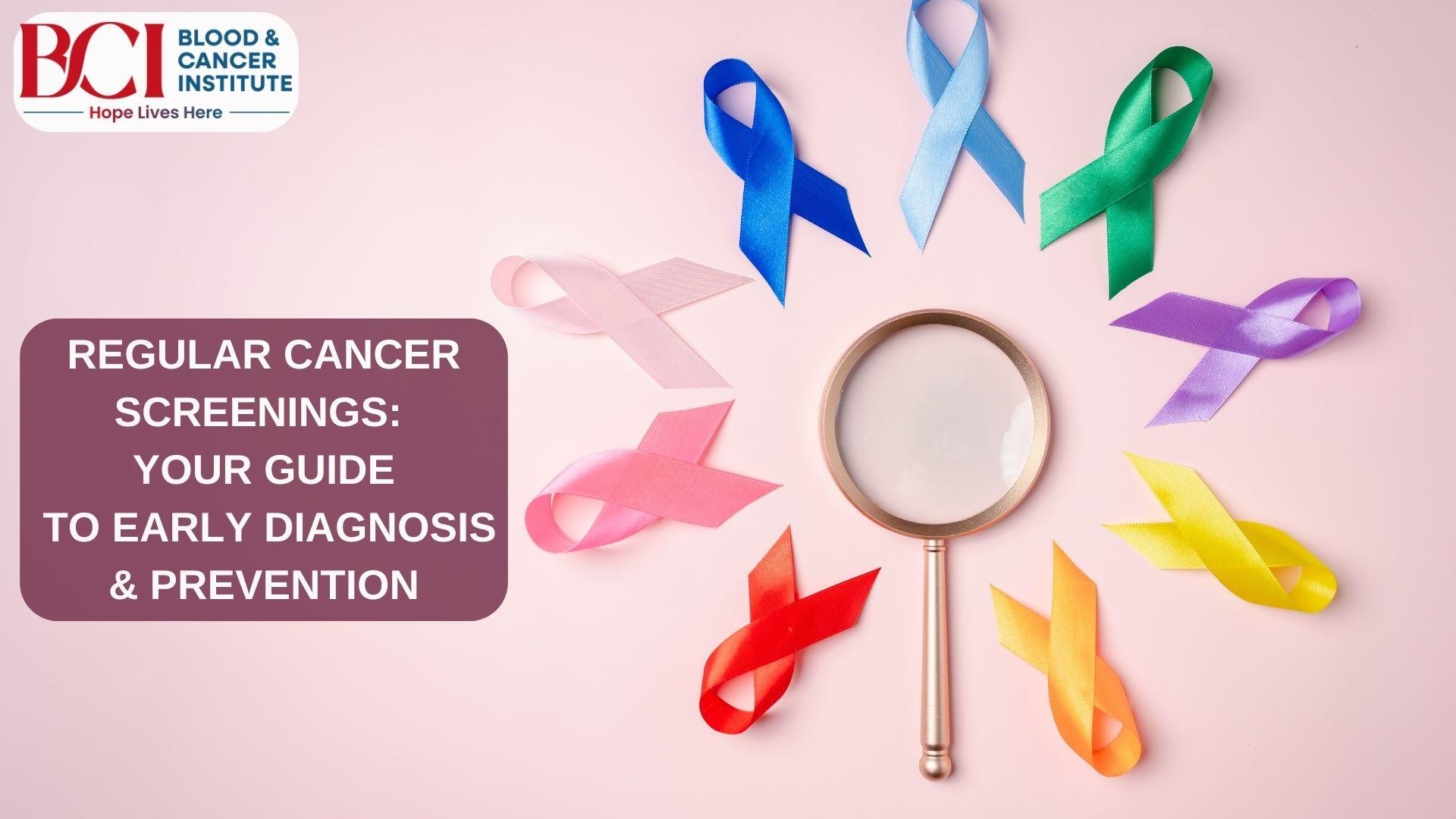
- By : BCI
- General
- Comments: 0
Regular Cancer Screenings: Your Guide to Early Diagnosis & Prevention
Cancer is a leading cause of death worldwide, but early detection can significantly improve survival rates and treatment outcomes. Regular cancer screenings are a powerful tool in catching the disease in its earliest stages when it’s most treatable. For some cancers, screenings can even prevent the disease from developing altogether by identifying pre-cancerous conditions. In this blog post, our cancer specialists in Surat at BCI- Blood and Cancer Institute, explain the importance of regular cancer screenings, the types of tests available, and how they contribute to early diagnosis and prevention.
Why Are Regular Cancer Screenings Important?
Cancer often develops silently, with symptoms only becoming apparent in later stages. By then, the disease can be harder to treat. Regular screenings bridge this gap by detecting abnormalities long before symptoms appear, giving patients a better chance of cancer treatment in Surat.
Here’s why cancer screenings are essential:
- Early Detection Saves Lives
Catching cancer early dramatically increases the likelihood of successful treatment. For example, when detected early, breast cancer has a 5-year survival rate of nearly 100%. - Preventive Opportunities
Some screenings, such as colonoscopies, can identify and remove pre-cancerous polyps, preventing cancer from developing in the first place. - Cost-Effective Treatment
Early-stage cancers are often less expensive to treat than advanced cancers, reducing the financial burden on patients and healthcare systems. - Improved Quality of Life
Early treatment often means less invasive procedures, shorter recovery times, and fewer long-term complications.
Types of Cancer Screenings
There isn’t a one-size-fits-all approach to cancer screenings, as they vary based on age, gender, family history, and lifestyle factors. Below are some of the most common types of cancer screenings:
1. Breast Cancer Screening
● Method: Mammograms are the primary screening tool for breast cancer. They use low-dose X-rays to detect abnormalities in breast tissue.
● Who Should Screen: As suggested by our breast cancer specialist in Surat at BCI- Blood and Cancer Institute, women aged 40–74 are typically recommended to have mammograms every 1–2 years, depending on their risk factors.
2. Cervical Cancer Screening
● Method: Pap smears and HPV tests check for pre-cancerous changes in the cervix and high-risk human papillomavirus infections.
● Who Should Screen: Women aged 21–65 should get a Pap smear every 3 years or a Pap-HPV co-test every 5 years.
3. Colorectal Cancer Screening
● Method: Colonoscopy, sigmoidoscopy, and stool-based tests are used to detect polyps or early-stage cancers in the colon or rectum.
● Who Should Screen: Adults aged 45 and older are recommended to start regular screenings, with frequency depending on the method used.
4. Lung Cancer Screening
● Method: Low-dose computed tomography (LDCT) is used to detect lung cancer in its early stages.
● Who Should Screen: Lung cancer specialists in Surat strongly advise current or former heavy smokers aged 50–80 with a significant smoking history to opt for annual screenings.
5. Prostate Cancer Screening
● Method: Prostate-specific antigen (PSA) blood tests and digital rectal exams (DRE) are used to screen for prostate cancer.
● Who Should Screen: Men aged 50 and older, or earlier for those at higher risk (e.g., African American men or those with a family history).
6. Skin Cancer Screening
● Method: Skin exams performed by a dermatologist can detect melanoma or other skin cancers.
● Who Should Screen: People with fair skin, a history of sunburns, or a family history of skin cancer should get regular checks.
Preparing for a Cancer Screening
Proper preparation for cancer screenings can ensure accurate results and reduce anxiety. Here’s how to get ready:
● Discuss your personal and family medical history with your doctor to determine which screenings are appropriate for you.
● Some screenings, like colonoscopies, require dietary restrictions or laxatives beforehand. Follow these instructions carefully for accurate results.
● Don’t hesitate to ask your healthcare provider about the procedure, its benefits, and potential risks. Understanding the process can ease any concerns.
● Set reminders for your screenings based on the recommended schedule for your age, gender, and risk level.
How Regular Screenings Contribute to Prevention
While not all cancers can be prevented, regular screenings from the best cancer hospital in Surat, like Blood and Cancer Institute, can play a critical role in reducing your risk. Here’s how:
● Identifying Risk Factors: Screenings can uncover conditions that increase your cancer risk, such as pre-cancerous lesions or genetic mutations.
● Promoting Healthy Habits: Regular screenings encourage proactive health management, such as quitting smoking, improving diet, or reducing sun exposure.
● Providing Peace of Mind: Knowing your status can alleviate the anxiety of uncertainty and empower you to take control of your health.
Conclusion
Regular cancer screenings detect cancer early, when treatment is most effective, and even prevent it in some cases. While the idea of screenings might feel daunting, the benefits far outweigh the risks or discomfort.
If you’re overdue for a screening, now is the time to take action. Speak to your healthcare provider about which tests are appropriate for you and set a schedule that aligns with your health needs.
Remember, early detection saves lives. Don’t wait — schedule your screenings today.
